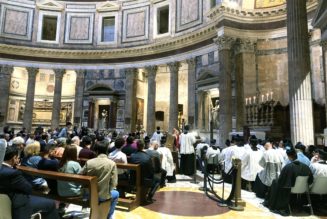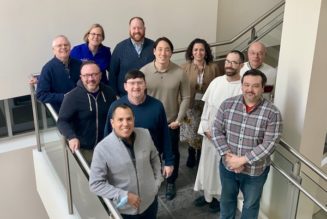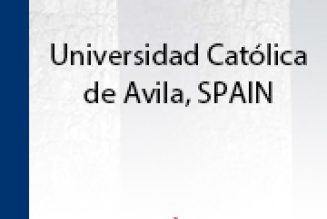
Jesus is God, and he has been listening to us pray all our lives. And after all he has heard, he wants to tell us how it sounds from his perspective on the 30th Sunday in Ordinary Time Year C.
He asks us a question he already knows the answer to: Are our prayers — yours and mine — more like the proud petitioner who thinks he is doing pretty great in his spiritual life, or are they more like the sad sinner who knows he isn’t doing very well at all?
It’s statistically very likely that you and I are more like the proud guy than the humble one.
St. Luke begins by saying “Jesus addressed this parable to those who were convinced of their own righteousness.” If you asked those who know us, the chances are that they would put us in that group. Nearly 90% of respondents thought Christians were judgmental and hypocritical in a Barna poll in 2007. In a 2022 poll, while Christians described themselves as giving, compassionate, loving, and respectful, non-Christians described us as hypocritical, judgmental, self-righteous and arrogant.
St. Luke also says the parable is for those who “despised everyone else.” Whether we are left-leaning or right-leaning, that probably includes us, too.
Research reported in the 2021 article “Conservatives and Liberals Are Wrong About Each Other“ suggests that a lot of us tend to despise each other. Self-identified conservatives estimated that nearly 63% of liberals were so close-minded they wanted politically incorrect speakers banned from campuses. In fact, only about 33% of liberals showed even an inkling of agreement. Liberals thought that 57% of conservatives were unwelcoming and hostile to immigrants, but only 22% expressed opinions that could be taken that way.
So the chances are that Jesus is describing you and me when he describes how the proud Pharisee in the story says, “O God, I thank you that I am not like the rest of humanity — greedy, dishonest, adulterous — or even like this tax collector. I fast twice a week, and I pay tithes on my whole income.”
We naturally find ways to put the spotlight on our own virtues, and excuse our faults. Then, when we look out at the world, we have a way of exaggerating others’ shortcomings and summing them up by them.
Ultimately the Pharisee is a narcissist. So, likely, are we who live in 21st century America.
Our times in the West have been summed up as a “culture of narcissism.” It’s not just that we are selfish — “narcissism” describes our tendency to constantly see our life from a self-adulatory remove, as if we were the leading character in a heroic (or tragic) film of our life.
Social media has turbo-charged our narcissism. By posting the stories of our lives leaving our faults out of the narrative and filtering our flaws out of the photos, we can start to believe our press releases and imagine that we really match the perfect image we are showing the rest of the world.
But human beings have never been immune from this excessive pride, at least not since the Fall. In fact, early Christian writer Martyrius says we get this tendency, directly from the great angel of light whose pride drove him out of heaven. Now he is always at our side with the same trick up his sleeve.
“Satan lies in ambush ready to catch you by surprise at the very time of thanksgiving,” he said. “He makes you drunk on pride in the lovely and sweet sound of your own voice, the beauty of your chants that are sweeter than honey and the honeycomb. The result is that you do not realize that these belong to God, and not to yourself.”
As soon as you take the bait, though, “He will get up and accuse you before God, just as he did with your fellow Pharisee in the temple.”
But you can beat narcissism in prayer the same way you can beat it on social media: by refusing to take the devil’s bait.
St. Ignatius struggled with his own narcissism and came up with the remedy of reviewing his day to get as objective view of himself as possible.
First, he reviewed all the great things God had given him in creation. Then, he reminded himself that God was present to him at all times during the day. Then he rummaged through his memory to see how well he accepted what God gave him — both his successes and failures. He bared his wounds before God and asked him to heal them with his mercy.
He learned what the widow from last Sunday’s Gospel and the tax collector in this Sunday’s learned. The Psalm this Sunday puts it beautifully: “The LORD is close to the brokenhearted; and those who are crushed in spirit he saves.” And the First Reading, from Sirach, says, “The prayer of the lowly pierces the clouds; it does not rest till it reaches its goal.”
So we have to ask: If we could interrupt the Pharisee at his self-centered prayer, what lesson would we want him to take from this? Because that’s the lesson for us. The first lesson is to be like the tax collector, and pray “O God, be merciful to me, a sinner.” Bishop Robert Barron says he does this by praying the “Jesus prayer” often: “Lord Jesus Christ, son of the living God, have mercy on me, a sinner.”
But the tax collector’s self-abasement isn’t the only good example we get this Sunday.
The readings also give us the great example of St. Paul, who in this Sunday’s reading doesn’t sound much like the tax collector at all. In fact, at first glance, at his boasting in the Second Reading sounds like the Pharisee.
After all, St. Paul, who was himself a Pharisee, says “I have competed well” and the “crown of righteousness awaits me.” Isn’t that the kind of self-congratulation Jesus criticizes? It looked that way to me, so I put some of the statements side by side to see if it was true. I found some important differences:
- The Pharisee says, “thank you that I am not like the rest of humanity.” But Paul sees the crown of righteousness not at his, alone, by rights — he specifically sees it as something “the Lord, the just judge, will award … not only to me, but to all who have longed for his appearance.”
- The Pharisee says, “I fast twice a week,” which is admirable, but puts him in control of his life, which he parcels out to God, on his own terms. St. Paul says “I am already being poured out like a libation.” His whole life is being poured out, not by Paul, but by God and for God.
- The Pharisee brags, “I pay tithes from my whole income,” making his strength the center of his spiritual life. But St Paul says, “the Lord stood by me and gave me strength,” putting the Lord’s strength in the center.
- But the biggest difference between the two is their location. The Pharisee “took up his position in the Temple area,” doubtless a position of honor, to talk to himself in prayer. Paul is writing from prison, not for his own benefit but to encourage Timothy.
The Pharisee sees himself as his own savior by his good works, and wants to separate himself from others. St. Paul sees God as the main character in his life’s salvation, and wants to bring others to salvation with him, saying “the Lord will rescue me from every evil threat.”
So, don’t be afraid to seek out and find an objective view of yourself.
At first, it will mean that you have to beat your breast continually with head bowed down at the back of the Church. But it will also help you see with greater clarity just how much God has blessed you — not because you are better or worse than the rest of humanity, but because he loves you as much as he loves them.
Each Mass takes us through the paces of a healthy self-conception, from the prayers where we plead for forgiveness to the remarkable moment when God agrees to come to us, just like he did for St. Paul — body, blood, soul and divinity.
Jesus has been listening to you praying your whole life long, so there’s no sense trying to hide from him. Show him your wounds. That’s the only way he can heal them.
Join Our Telegram Group : Salvation & Prosperity









